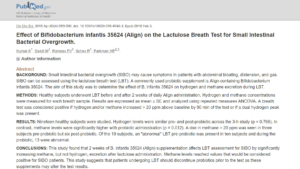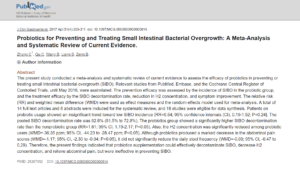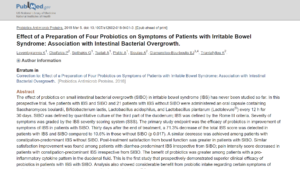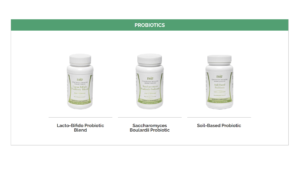Can Probiotics Cause SIBO?
SIBO (small intestinal bacterial overgrowth) is a condition of excess bacteria in the small intestine. Can taking a probiotic make this condition worse? One study suggested yes. However, this study is very misleading. Let’s discuss an accurate summary regarding probiotics and SIBO.
Dr. R’s Fast Facts Summary
No, probiotics cannot cause SIBO
- A rise in methane (> 20 ppm) was seen in three subjects pre-probiotic but in six subjects post-probiotic.
- Of the 19 subjects, an “abnormal” lactulose breath test pre-probiotic was present in ten subjects and during the probiotic, 13 were abnormal.
- In this one study 3 out of 19 subjects were affected.
However, there is a wealth of data showing probiotics can help both IBS and SIBO
- There are meta-analyses that show probiotics can treat, act against, and clean out SIBO.
- Clinical trial finding probiotics work better in patients with SIBO + IBS
- It is important to look at a body of evidence vs a single study.
Can you react negatively to probiotics?
- It is possible for people to have adverse reactions to different categories of probiotics that is why it is important to try different categories to see what works best for you. See the Fast Facts or listen to this previous podcast episode for a breakdown of probiotics by category.
- When trying a new probiotic, it is not uncommon to experience a little turbulence as things are balancing out. Give it 3 to 5 days and if symptoms continue, that probiotic may not be for you.
- Here are some of the probiotic categories we carry in our store:
- Get help using this information to become healthier.
- Get your personalized plan for optimizing your gut health with my new book.
- Healthcare providers looking to sharpen their clinical skills, check out the Future of Functional Medicine Review Clinical Newsletter.
Dr. Michael Ruscio: Hi, this is Dr. Ruscio. Let’s discuss the question, can probiotics cause SIBO? In short, no, probiotics cannot cause SIBO. And this is not something that you should be concerned about. However, what I’d like to do is outline what could be a confusing data point in this question and provide you with some tools to help you navigate through it.
So can probiotics cause SIBO? The short answer is no. We have meta-analyses which are arguably the highest level of scientific evidence showing that probiotics, in fact, can treat and act against and clean out small intestinal bacterial overgrowth in the intestinal tract.
However, I have received questions asking or commenting, “I’ve heard probiotics can cause SIBO and that I shouldn’t take them.” So let’s navigate through all these bits and bites.

But this study entitled, “Effect of Bifidobacterium infantis (or Align Probiotic) on the Lactulose Breath Test for Small Intestinal Bacterial Overgrowth.” Let me read you a few of the details or quotes. “A rise in methane of over 20 parts per million [ppm]”—so to diagnose SIBO (or small intestinal bacterial overgrowth), we use a breath test. And a rise of over 20 would be considered a positive for bacterial overgrowth. This was seen in three subjects pre probiotic administrations, or before they administered the probiotics, but in six post probiotic. So this affected three of the 19 subjects being studied.
So you took a group of essentially 19 people. And the probiotic appeared to cause SIBO or a positive breath test in 3 people of 19 in one study.
Now, you can find a study to show almost anything. This is why I’ve said several times you should not use one study to inform your decision making. You should look at what the body of evidence shows at large.

And that’s where we see here. I’m linking to one systematic review and also one clinical trial showing that probiotics work better in alleviating digestive symptoms in those with SIBO compared to those without SIBO.

Sponsored Resources
We’ve discussed previously that your mouth is the first section of your gut. So in order to have a healthy gut, you have to have a healthy mouth. That’s why I like Quip’s Electric Toothbrush, which is ADA approved. That’s the American Dental Association.

What I like about Quip also is that their electric toothbrush starts at $25, which is much cheaper than most electric toothbrushes. If you go to GetQuip.com/RuscioPodcast, you’ll get your first refill pack free with a purchase of Quip’s Electric Toothbrush. That’s your first refill pack free at GetQuip.com/RuscioPodcast.
Now, that doesn’t mean that no one can have or will have a negative reaction to probiotics. There is a small subset of people who negatively react to probiotics. This is why in my book Healthy Gut, Healthy You I outline a 3-category system of probiotics so you can try one probiotic from each category to see what category of probiotic has benefit for your gut. And rather than just trying the litany of products out there, you can understand category 1, category 2, category 3. And you can try one probiotic from each.

So be cautious with what you read on the internet. And I would make sure to filter things that you hear through someone whose opinion you trust because it is important. And information used incorrectly can actually detract from your health rather than contributing to your health.
So probiotics can help with SIBO. And I would have no reservation using a probiotic if you have SIBO. Of course, use your own experience and some common sense. If you take a probiotic and you notice a negative reaction that lasts more than a few days, then a probiotic may not be a good fit for you.
The reason I say “more than a few days” is a little bit of turbulence for a few days as things are balancing out and your body is adjusting to a probiotic is not abnormal. So you don’t want to jump ship after a little bit of turbulence for a day. Give yourself three to five days. And if turbulence or any kind of negative symptom is still persisting after five days, up to a week, then that probiotic is likely not good for you. And try one of the other categories.
All right. This is Dr. Ruscio. And hopefully, this information helps you get healthy and get back to your life.
What do you think? I would like to hear your thoughts or experience with this.
- Get help using this information to become healthier.
- Get your personalized plan for optimizing your gut health with my new book.
- Healthcare providers looking to sharpen their clinical skills, check out the Future of Functional Medicine Review Clinical Newsletter.
Dr. Ruscio is your leading functional and integrative doctor specializing in gut related disorders such as SIBO, leaky gut, Celiac, IBS and in thyroid disorders such as hypothyroid and hyperthyroid. For more information on how to become a patient, please contact our office. Serving the San Francisco bay area and distance patients via phone and Skype.
Discussion
I care about answering your questions and sharing my knowledge with you. Leave a comment or connect with me on social media asking any health question you may have and I just might incorporate it into our next listener questions podcast episode just for you!